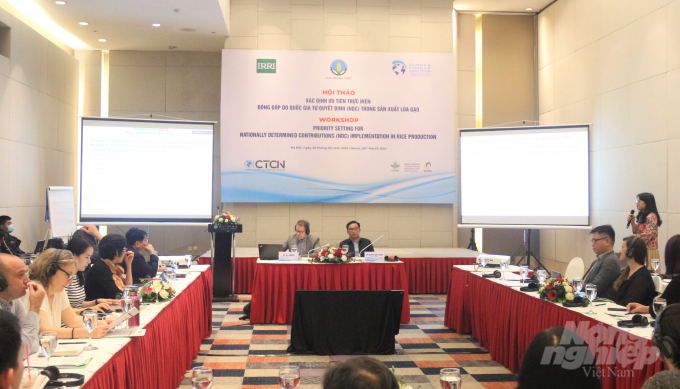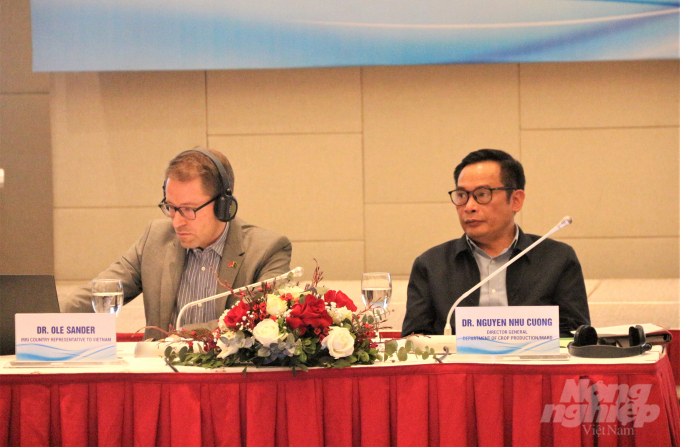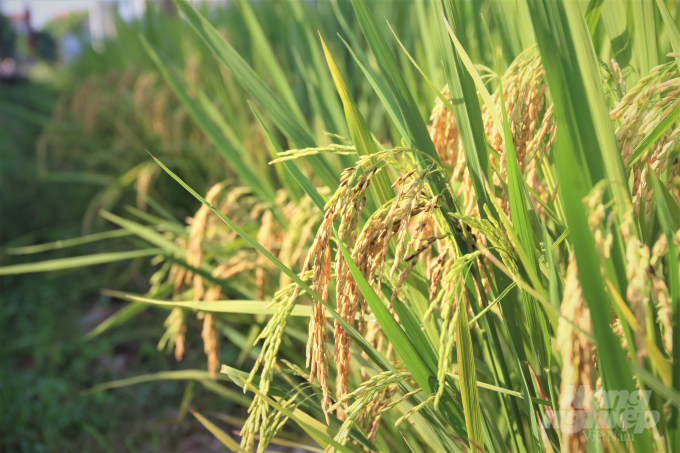June 20, 2025 | 12:45 GMT +7
June 20, 2025 | 12:45 GMT +7
Hotline: 0913.378.918
June 20, 2025 | 12:45 GMT +7
Hotline: 0913.378.918

: The workshop to set priorities for Viet Nam's Nationally Determined Contribution (NDC) implementation plan for the rice sector was held on March 26 in-person and online in Ha Noi. Photo: Pham Hieu.
Reducing greenhouse gases emission in rice production would bring sustainable benefits to socioeconomic development and environmental protection.
The Department of Crop Production of Viet Nam under the Ministry of Agriculture and Rural Development, in collaboration with the International Rice Research Institute (IRRI) and the Climate & Clean Air Coalition (CCAC), on March 26 organised a workshop to set priorities for Viet Nam's Nationally Determined Contribution (NDC) implementation plan for the rice sector.
The workshop is the first of its kind that aims to help Viet Nam to identify priority measures for NDC implementation in the agriculture and rural development sectors.

Head of the Department of Crop Production of Viet Nam, Nguyen Nhu Cuong (right) and head of the International Rice Research Institute’s Country Office in Vietnam Ole Sander at the workshop. Photo: Pham Hieu.
Scenarios for NDC implementation in the rice sector were introduced at the workshop.
The rice sector plays an important role in agriculture and rural development, ensuring national food security, social security and affecting the livelihood of many farmers. In Vietnam, the rice sector has advantages in ecological conditions and it is associated with the country’s cultural values and heritages of a long-standing wet rice civilization.
However, the rice sector in Vietnam is facing challenges relating to low efficiency, resource intensiveness, environmental pollution and climate changes.
According to the agriculture ministry, a project on restructuring the rice sector during the period 2025-2030 was approved early this year, expected to increase efficiency and ensure sustainable development for the industry.
Under the project, Vietnam would implement measures to form and increase the efficiency of rice value chains, adapt and mitigate climate changes’ impacts, protect the environment, increase farmers’ income and consumers’ interests as well as export high-quality rice.
In September 2020, Vietnam submitted its NDC implementation plan. IRRI has developed and analyzed three scenarios for the NDC implementation of the rice sector.

Reducing greenhouse gases emission in rice production will generate sustainable socio-economic and environmental benefits. Photo: Pham Hieu.
The scenarios show the benefits of farming techniques helping farmers increase their net income through reducing the cost of paddy cultivation, increasing health and environmental benefits and bringing great economic potential from carbon credit when a carbon trading market takes shape in Vietnam.
IRRI, CCAC, CTCN and the Research Programme on Climate Change, Agriculture and Food Security developed a toolkit to support Vietnam in making NCD implementation plan including MapAWD - mapping tool suitable for application of irrigation techniques. Alternate wetting and drying (AWD), SECTOR - a tool to calculate greenhouse gas emissions in rice production, and COMPARE - a cost-benefit analysis tool in rice cultivation.
Translated by Bich Huong
/2025/06/17/3942-2-143243_548.jpg)
(VAN) Recently, in Sweden, the Secretary of the Binh Dinh Provincial Party Committee presented the Investment Registration Certificate for the 'Polyester Fabric Recycling Complex' project to SYRE Impact-AB Company.
/2025/06/12/3721-2-202745_83.jpg)
(VAN) TH made an impression at Seoul Food 2025 with its line of natural beverages, paving the way for Vietnamese food products to enter the South Korean market.

(VAN) Soc Trang's success in rice exports stems from a strategy of developing fragrant and specialty rice cultivation areas and standardizing production toward low-emission practices.
/2025/06/11/1311-5-120811_839.jpg)
(VAN) The pig farming industry is facing the challenge of comprehensive restructuring to meet requirements for quality, safety, traceability, and market expansion both domestically and for export.

(VAN) Vietnam considers participating in ALGROALBA in order to expand agricultural production, coordinate the assessment and effective exploitation potential land.
/2025/06/05/5314-1-184727_407.jpg)
(VAN) From seemingly worthless fish scales and skin, enzymes and lactic ferments can transform by-products into peptides, opening a sustainable, effective business direction and elevating Vietnamese seafood.

(VAN) TTC AgriS and IFC signed a strategic partnership to develop a sustainable agricultural value chain, aiming to achieve the Net Zero target by 2035.